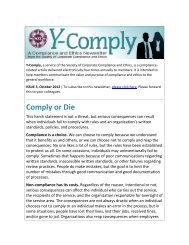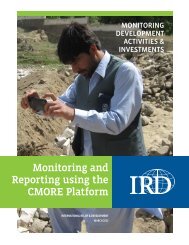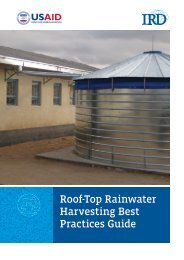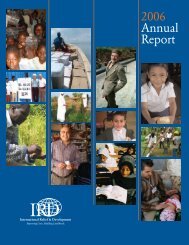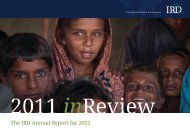Empowering citizens Engaging governments Rebuilding communities
Empowering citizens Engaging governments Rebuilding communities
Empowering citizens Engaging governments Rebuilding communities
You also want an ePaper? Increase the reach of your titles
YUMPU automatically turns print PDFs into web optimized ePapers that Google loves.
“<br />
At the end of the day, it was all about one<br />
thing: jobs, jobs, jobs. It was to help people<br />
get back to what they were doing before”<br />
—Michele Lemmon<br />
sewage and drainage canals, and water treatment<br />
plants for safe drinking water. These projects<br />
were the fastest to get off the ground and showed<br />
the quickest results, and they included the trash<br />
cleanup campaigns that were a hallmark of the<br />
early part of the program. Internally, this component<br />
was known as CIES.<br />
• Generate long-term (more than three months) jobs<br />
by establishing vocational training and employment<br />
service centers,particularly for young and<br />
unemployed Iraqi males. Other groups considered<br />
high risk for recruitment into insurgency, such as<br />
widowed women, were also targeted. Training was<br />
given for construction and nonconstruction trades,<br />
as well as in courses such as sewing and cosmetology<br />
intended to bring in women. Apprenticeships<br />
and follow-up employment assistance services<br />
were also offered.<br />
• Encourage business development and local ownership<br />
through management training courses and<br />
grants to new or current businesses in agriculture,<br />
industry, manufacturing, and trade services. These<br />
business development grants, which ranged from<br />
$500 to $100,000 and were in the form of equipment<br />
and materials, were based on the potential<br />
for job creation, higher incomes, positive impact<br />
on the community, and the grantee’s own contribution.<br />
Some of the most visible examples of these<br />
grants are the hundreds of shops that were rebuilt<br />
after being destroyed or damaged in violent market<br />
attacks.<br />
• Mitigate conflict by engaging Iraqis socially and<br />
culturally.Young men (and to a lesser extent<br />
women) were the intended targets, but IRD aimed<br />
higher, hoping its activities would also contribute to<br />
bringing together <strong>citizens</strong> from different religious,<br />
ethnic, and political backgrounds. In coordination<br />
with local community leaders and civic groups, IRD<br />
sponsored community programs, such as athletic<br />
events, art programs, computer training, and<br />
healthy living courses.<br />
Successful implementation depended on the ability<br />
of IRD’s program team to work with the provincial<br />
councils, neighborhood advisory councils, and district<br />
advisory councils to establish component-specific<br />
strategies. Although the partners varied between<br />
cities, CSP consistently worked through all levels of<br />
local government leaders to identify and implement<br />
projects. The councils were formed after the Coalition<br />
Provisional Authority took over administration of the<br />
Iraqi government, and they served as a primary governing<br />
body in many localities before eventually becoming<br />
part of the provincial government.<br />
A balance between military strategy and community need<br />
Although many IRD staff recalled extreme challenges<br />
while working with council members, including personal<br />
threats and bribe requests, the councils were necessary<br />
to the implementation process, especially during<br />
the first year. “CSP didn’t select the projects,” said<br />
Awni Quandour, who left ICAP to become a transitional<br />
chief of party for CSP. “They were strictly the choice of<br />
council members.” Quandour made regular visits to city<br />
officials in Baghdad to try and overcome one of the program’s<br />
earliest challenges—the city’s deep religious<br />
divides. Projects in Sunni neighborhoods still had to<br />
get approval from the Shia council members, and vice<br />
versa. “CSP tried to be as fair as possible,” Quandour<br />
said, but in some cases “it wasn’t fair; it was politics.”<br />
Because of the pressure IRD applied on local leaders<br />
to ensure the program moved forward, Quandour said<br />
they were able to proceed without alienating Sunni or<br />
Shia neighborhoods.<br />
“IRD always talks about its focus on communitybased,<br />
or community-led, development work, and I<br />
think that’s where it made the big difference,” said<br />
2<br />
A complete stabilization package<br />
27


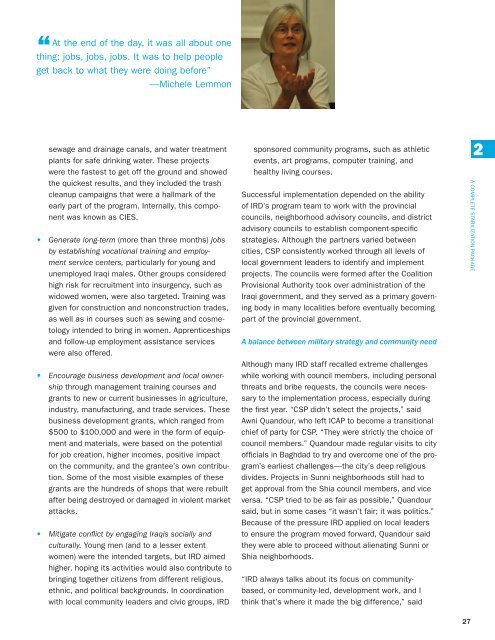
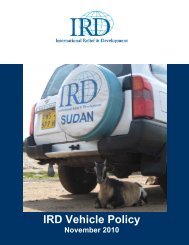
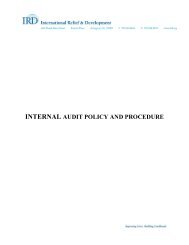
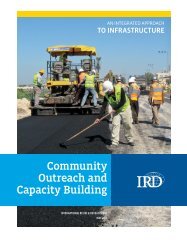
![Guide bonne pratique production d'oignon qualité_VF_4_2411012[1]](https://img.yumpu.com/23506639/1/184x260/guide-bonne-pratique-production-doignon-qualitac-vf-4-24110121.jpg?quality=85)

